Avast vs Kaspersky: Which Antivirus Is Better in 2025?
Avast and Kaspersky have been around for years, but it’s hard to figure out which is better for overall protection. Of course, Avast’s history of stealing user data and Kaspersky’s potential links to Russian intelligence make this even more challenging.
After rigorous testing, I found that Kaspersky outperforms Avast in most categories. It offers marginally better malware detection via scans, more features, and responsive customer support. So, strictly between the two, Kaspersky is the better choice.
However, considering the risks with both, I instead suggest you get Norton to secure your devices. It offers industry-leading 100% malware detection, excellent customer support, well-priced plans, and a 60-day money-back guarantee. Also, it’s a renowned and trusted antivirus, meaning you don’t have to worry about potential privacy breaches.
Try Norton risk-free for 60 days
No Time? Here’s a 1-Minute Summary of Category Winners
After thorough testing, I found Kaspersky to be the superior antivirus. It has a better malware detection rate via scans, responsive customer support, and a wider variety of features. Avast also has strengths, like its easy-to-configure firewall and a free plan that works on all platforms. However, Kaspersky is the better overall choice.
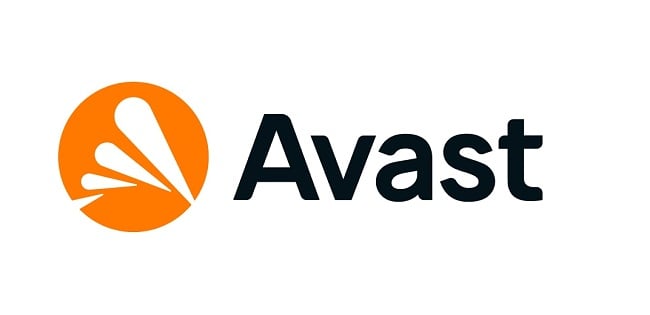 |
||
| Virus Scanner | 6 scan types and a 99.8% malware detection rate | Offers 7 scans and detects 99.96% of malware |
| Real-Time Malware Protection | Detects 100% of real-time threats | Blocks 100% of real-time threats |
| System Performance | Small yet noticeable impact on system performance | Negligible impact on device performance |
| VPN | Offers fast connection speeds and covers 30+ countries | Excellent streaming performance and has servers in 70+ countries |
| Parental Controls | Does not offer parental controls | Comes with a thorough suite of parental controls |
| Firewall | Intuitive, customizable, and secure firewall | Offers a secure firewall but it isn’t beginner-friendly |
| Password Manager | No longer offers a built-in password manager | Feature-rich password manager that also checks for compromised credentials |
| Gaming Mode | Do Not Disturb mode that silences notifications | Has Game and Do Not Disturb modes to silence notifications |
| Optimization Tools | Cleanup Premium helps free up space on your system | Quick Startup, PC Speed-Up, Battery Saver, and various other optimization tools |
| Other Features | Not many features other than its Data Shredder, Webcam Shield, and Secure Browser | File Shredder, Webcam and Microphone Protection, Mail Protection, and various other features |
| Device Compatibility | Works on Windows, macOS, iOS, and Android | Protects Windows, macOS, iOS, and Android devices |
| Customer Service | Offers 24/7 live chat, phone support, and email but connecting to an agent can take a while | Responsive customer support via 24/7 live chat, phone support and email |
| Price | Has 2 paid plans, but they aren’t the best value | Offers excellent value for money on all 3 paid plans |
| Free Version | Offers a basic free plan for all platforms | Includes a basic free plan but it doesn’t protect macOS devices |
| Money-Back Guarantee | 30 days | 30 days |
Try Kaspersky risk-free for 30 days
How I Tested and Compared Avast vs Kaspersky
To find out which antivirus is superior, I tested Avast and Kaspersky across the following 15 categories to make it as thorough as possible:
- Virus Scanner — I tested how effectively the antiviruses find and eliminate antiviruses via their scans.
- Real-Time Malware Protection — I analyzed each antivirus’ performance against 0-day malware and real-time threats.
- System Performance — I monitored my system while running both security apps to see which one consumes fewer resources.
- VPN — I compared both security apps’ VPNs to see which offers faster speeds, more servers, and better security.
- Parental Controls — I checked if either antivirus offers parental controls and whether these controls are effective.
- Firewall — I analyzed how secure the firewalls are in each antivirus and whether they’re customizable.
- Password Manager — I checked if either antivirus offers a password manager and which is better for safeguarding credentials.
- Gaming Mode — I tried the gaming/do not disturb modes in each security app to check if they improved gaming performance.
- Optimization Tools — I used the optimization tools available in each antivirus and checked if they improve system performance.
- Other Features — I tested the additional features available in both apps to see which antivirus is more secure.
- Device Compatibility — I checked which antivirus works on a wider range of devices.
- Customer Service — I contacted each antivirus’ customer support through all available channels to see how helpful and responsive they are.
- Price — I compared both antiviruses’ paid plans to see which one offers better value for money.
- Free Version — I checked if either security app offers a free plan and whether it’s worth using.
- Money-Back Guarantee — I bought plans for each antivirus and claimed the money-back guarantees to test their refund policies.
Try Kaspersky risk-free for 30 days
1. Virus Scanner — Kaspersky Has a Better Malware Detection Rate
Neither Avast nor Kaspersky is perfect at detecting malware through scans. However, Kaspersky detects a larger percentage of malware at 99.96% and offers more scans. Plus, it flagged fewer false positives.
Kaspersky and Avast offer the following scans:
| Avast | Kaspersky |
| Quick Scan | Quick Scan |
| Full Scan | Full Scan |
| Targeted Scan | Selective Scan |
| Boot-Time Scan | Instant File Scan |
| Smart Scan | Removable Drive Scan |
| Custom Scan | Background Scan |
| – | Application Vulnerability Scan |
Both antiviruses offer many useful scans that secure your system. I especially like Avast’s Boot-Time Scan, which runs before your OS loads to detect well-hidden malware. Avast also has an impressive detection rate of 99.8%, but it’s a bit lower than Kaspersky’s.
I also noticed that Avast’s scans are quicker than Kaspersky’s. Avast’s Quick Scan took only 2 minutes to complete, while Kaspersky’s Quick Scan on the same system took 5 minutes. Despite this, I prefer Kaspersky’s virus scans as they detect malware more accurately while flagging fewer safe files as malicious. So, Kaspersky wins in this category.
Virus Scanner Winner: Kaspersky
2. Real-Time Malware Protection — Both Security Apps Block 100% Of Real-Time Threats
I was very impressed with both security apps in terms of real-time protection. Kaspersky and Avast blocked 100% of real-time threats during tests, which is better than the industry average of 98%. Plus, they offer several tools to keep you safe as you surf the web and do other tasks on your devices.
Avast offers excellent phishing protection to safeguard you from scams online. It uses AI to scan every webpage you visit and instantly blocks you from opening any phishing websites on your devices.
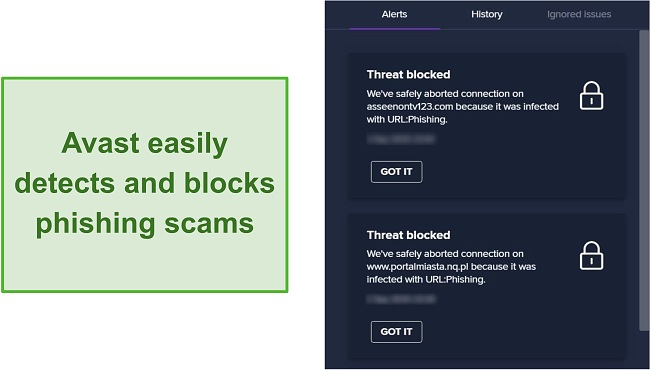
Kaspersky’s System Watcher provides effective real-time protection against ransomware, cryptojacking, and other exploits. Once enabled, it works in the background and instantly detects attempts to perform unauthorized actions on your system.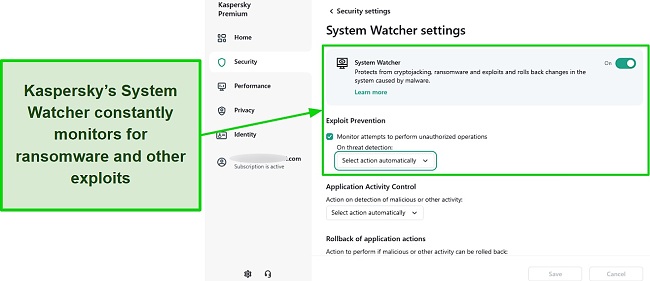
Alongside detecting 100% of real-time threats and providing other tools for protection, both Kaspersky and Avast stopped me from downloading malicious files. I tried downloading multiple known malware files, including those hidden in zip files, but both antiviruses blocked the downloads before completion.
Since both antiviruses provide excellent real-time security, it’s a tie here.
Real-Time Malware Protection Winner: Tie
Secure your system with Norton
3. System Performance — Kaspersky’s Impact on System Performance Is Negligible
Kaspersky consumes fewer system resources thanks to its cloud-based engine. I tested both antiviruses’ impact on system performance by doing various tasks while they ran scans in the background. Also, I tested to see how they affect system performance while idle. The following table demonstrates their impact on resources:
| Idle CPU Usage (Average) | Idle Memory Usage (Average) | Idle Disk Usage (Average) | Full Scan CPU Usage (Max) | Full Scan Memory Usage (Max) | Full Scan Disk Usage (Max) | |
| Avast | 10% | 250MB | 10MB/s | 56% | 723MB | 76MB/s |
| Kaspersky | 4% | 140MB | 5MB/s | 32% | 411MB | 72MB/s |
While Avast also has a relatively small effect on performance, it’s more noticeable, so Kaspersky wins in this category. However, if system performance is a top priority, I suggest you get Norton to secure your system. Norton’s apps on all platforms are even lighter and never slow down device performance.
System Performance Winner: Kaspersky
Protect your devices with Norton
4. VPN — You Get Access to More Locations With Kaspersky’s VPN
Both antiviruses come with excellent VPNs, but I consider Kaspersky’s VPN the better choice. It offers servers in 70+ countries and has various useful features, including the following:
- AES 256-bit Encryption — Industry-standard encryption that lets you safely surf the web.
- Built-in Kill Switch — Immediately kills your connection if the VPN disconnects.
- Split Tunneling — Lets you specify which apps’ traffic gets routed through the VPN tunnel.
- Smart Protection — Automatically turns on the VPN if you connect to an unsecured public network.
Alongside providing excellent security, this VPN delivers solid streaming performance. I asked my colleagues to test it, and Kaspersky’s VPN unblocks all popular streaming platforms, including Netflix, Hulu, Amazon Prime Video, Disney+, and HBO Max. Also, the speeds always remained fast enough for lag-free UHD streaming, even on long-distance servers.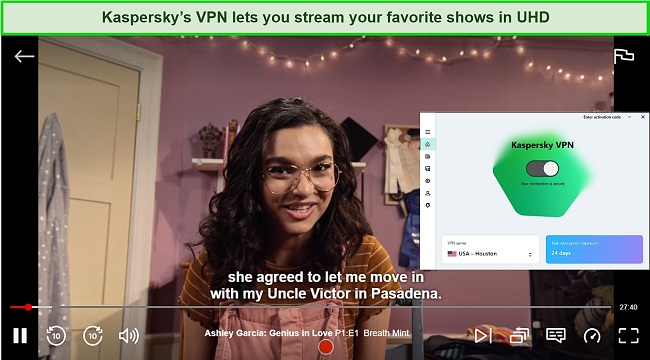
Avast’s VPN isn’t as good but still has its strengths. It offers servers in 30+ countries, much less than what you get with Kaspersky’s VPN. However, connection speeds are fast across all its servers. Plus, it offers the following features:
- AES 256-bit Encryption — Unbreakable encryption to keep you safe online.
- P2P Support — Various P2P-optimized servers for torrenting.
- Built-in Kill Switch — Disconnects your internet if the VPN connection drops.
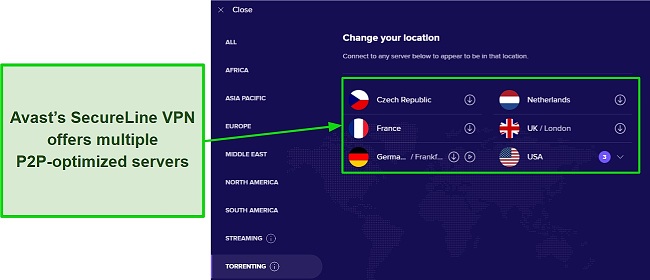
My team and I got mixed results after testing this VPN’s streaming capabilities. Avast’s SecureLine VPN unblocks Netflix and Disney+ but fails to access other popular platforms like Hulu, HBO Max, and Amazon Prime Video.
Both VPNs provide fast connection speeds, but Kaspersky wins here as its VPN is better at streaming and offers servers in more countries.
VPN Winner: Kaspersky
Browse securely with Kaspersky
5. Parental Controls — Kaspersky’s Thorough Suite of Parental Controls Helps Keep Your Kids Safe
While Avast doesn’t offer any parental controls, Kaspersky’s excellent suite of parental controls impressed me greatly. It has all the tools needed to monitor your kids’ online activity and keep them safe from digital threats.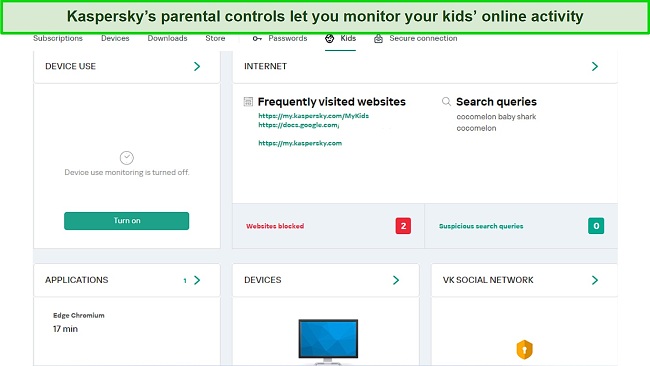
You can use Kaspersky’s Safe Kids controls to safeguard your children from inappropriate sites and monitor their searches on websites like YouTube. Plus, they offer several other useful features, including the following:
- Screen Time Control — Lets you specify exactly how much screen time your child is allowed.
- Location Tracking — Provides real-time updates about your kids’ location.
- Geofencing — Alerts you when your child leaves a specified radius.
- Website and App Filtering — Lets you block inappropriate apps or websites on your child’s device.
Overall, the feature-rich parental controls make it clear that Kaspersky takes child safety seriously, so it’s the winner in this category.
Parental Controls Winner: Kaspersky
Safeguard your kids with Kaspersky
6. Firewall — Both Options Have Excellent Firewalls, but Avast’s Is More Intuitive
Although both antiviruses have a secure firewall, I found Avast’s a lot easier to configure. The default configuration provides excellent security, and it’s easy to adjust the settings if you want to further customize the firewall.
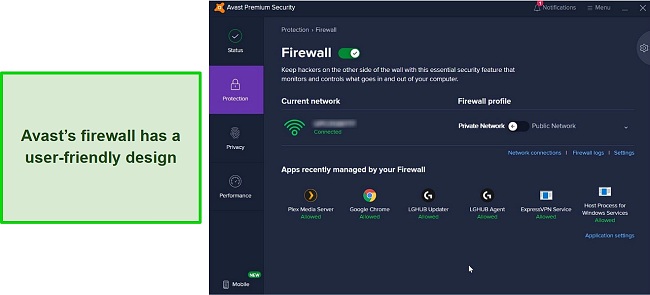
Avast’s firewall lets you connect to public networks in stealth mode (preventing others on the network from obtaining your information) and block remote connections. Plus, you can even block apps from connecting to the internet entirely.
On the other hand, Kaspersky’s firewall is quite secure, though it lacks the intuitiveness you find with Avast’s. Adjusting its settings could be challenging, but it’s pre-configured to serve as an excellent first line of defense against threats right out of the box. Advanced users can adjust the configuration by navigating to the Application and Packet rules menus, but there’s no beginner-friendly interface.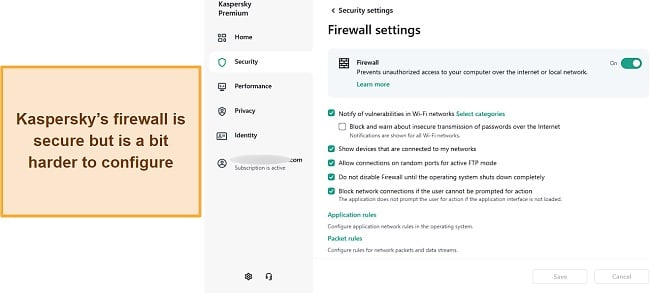
Overall, while both security apps offer a secure firewall, Avast’s intuitiveness makes it the winner here. However, I found that Norton’s firewall is more secure and customizable than both of these options. It provides airtight security and has all its configuration toggles neatly presented and defined, thus letting you make changes with a few clicks.
Firewall Winner: Avast
Secure your system with Norton
7. Password Manager — Kaspersky Provides a Secure and Reliable Password Manager
Avast no longer offers Avast Passwords in its subscriptions. On the other hand, Kaspersky provides an excellent password manager with various features to safeguard your credentials. Also, it has an easy-to-use interface that lets you easily view and manage your stored passwords.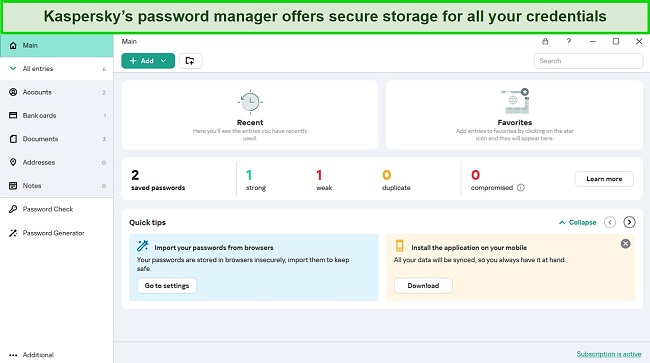
I especially like the Password Check feature in Kaspersky’s password manager because it gives detailed insights about your overall password security. Password Check lets you know if you have weak or duplicate passwords and even checks if any of your credentials have been leaked in breaches.
You can use Kaspersky’s password manager to store account passwords, sensitive documents, notes, card details, and other sensitive information. Also, it offers a password generator that lets you generate unbreakable passwords to use on your accounts.
Since Kaspersky has such an effective password manager, and Avast no longer offers one, it’s clear who the winner is here.
Password Manager Winner: Kaspersky
Guard your credentials with Kaspersky
8. Gaming Mode — Neither Antivirus Offers an Impactful Gaming Mode
Neither antivirus provided noticeable gaming performance improvements. Avast has a Do Not Disturb mode to silence notifications, while Kaspersky offers a Do Not Disturb mode and a Game Mode. Unfortunately, none of these options affect or improve gaming performance significantly.
As the name suggests, Avast’s Do Not Disturb mode silences any notifications from the app, so you aren’t bothered by them while gaming. However, it doesn’t optimize performance in any way.
Kaspersky’s Game and Do Not Disturb modes work similarly, but the Game Mode also suspends scans and database updates, so they don’t take up resources. Again, neither of these modes noticeably improves gaming performance, so it’s a tie here.
Gaming Mode Winner: Tie
Protect your devices with Norton
9. Optimization Tools — Kaspersky Has a Better Variety of Optimization Tools
Both security apps have their share of optimization tools, but Kaspersky’s optimization tools offer much better performance benefits. The following are some of the tools Kaspersky provides to help improve system performance:
- PC Speed-Up — Cleans registry issues and temporary files to help boost system performance.
- Quick Startup — Helps your PC boot faster by disabling unnecessary apps at startup.
- Duplicate File Checker — Finds and removes duplicate files to free up space.
- Battery Saver — Helps you make the most of your device’s battery life.
I found the PC Speed-Up tool especially useful as it helped me free up multiple GB of space on my PC and found registry issues slowing it down.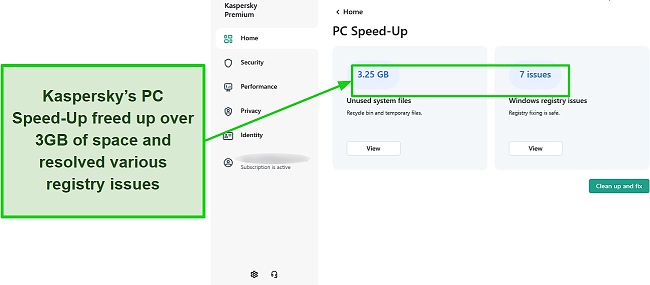
Avast also has its Cleanup Premium tool for device optimization, but it’s a lot less effective than Kaspersky’s tools. Cleanup Premium removes temporary files and bloatware, so it frees up space but doesn’t make any other useful optimizations.
Kaspersky wins between the two here thanks to its impressive variety of optimization tools. However, Norton is much better at optimizing your device than both choices. It has 1-click tools that help improve and monitor device performance, thus letting you make the most of your system.
Optimization Tools Winner: Kaspersky
Protect your devices with Kaspersky
10. Other Features — Kaspersky Has a Wide Array of Features That Provide Extra Layers of Security
Between both security apps, Kaspersky offers a better variety of extra features. Avast’s features include its Data Shredder, which lets you permanently delete sensitive files to make them unrecoverable. It also offers the following features:
- Webcam Shield — Blocks any unauthorized webcam access.
- Secure Browser — A safe browser where you can easily use payment and banking portals.
- AntiTrack — Stops websites from collecting your information to build a profile.
- Sandbox — An isolated environment to test unsafe programs.
I found Avast’s Sandbox particularly useful, as I used it to securely test potentially unsafe apps so they couldn’t harm my system.
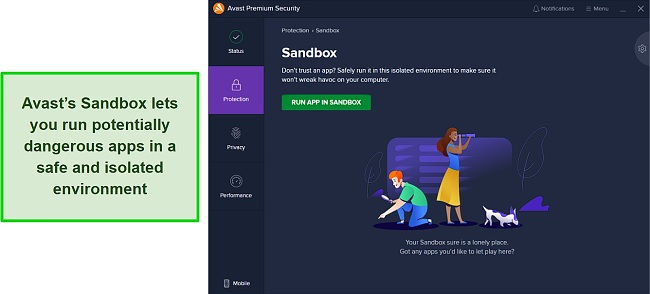
Avast’s extra features are useful, but there aren’t that many of them. On the other hand, Kaspersky offers a wide variety of additional features, which include:
- Webcam and Microphone Protection — Blocks unauthorized access to your webcam and microphone.
- Safe Money — A secure browser where you can bank and shop online with peace of mind.
- Cloud Storage — Helps you back up sensitive files to an external cloud storage service.
- File Shredder — Securely deletes files, so they’re no longer accessible.
- Data Leak Checker — Lets you check if your email has been involved in data breaches.
All of Kaspersky’s features help improve your overall security by a lot. I also like that its Data Leak Checker lets you check multiple emails instead of just the one you sign up with.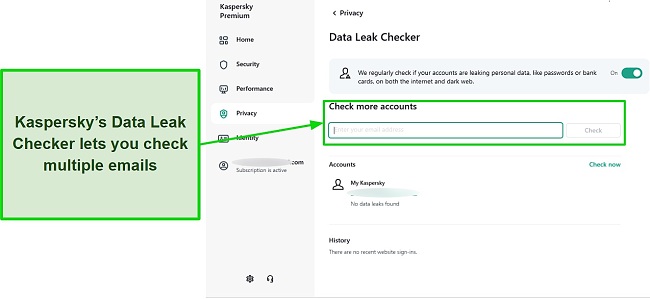
Overall, Kaspersky’s excellent feature variety makes it the obvious winner in this category.
Other Features Winner: Kaspersky
Safeguard your devices with Kaspersky
11. Device Compatibility — Both Security Apps Work on All Major Platforms
Avast and Kaspersky are excellent in terms of device compatibility. You can use Kaspersky on all major platforms, including Windows, macOS, iOS, and Android. Avast also supports all these platforms, meaning you can use either antivirus to safeguard all your devices.
Both antiviruses are also really easy to install, regardless of the device. The setups on mobile are easy as you can quickly install either app from the Google or Apple store. Also, desktop setups are simple since you just follow a few steps to have either antivirus up and running.
Since both antiviruses work on all major platforms and are easy to install, it’s fair to call it a tie here.
Device Compatibility Winner: Tie
Protect your devices with Norton
12. Customer Service — It’s Much Quicker and Easier to Get in Touch With Kaspersky’s Support
Kaspersky’s customer support is much better than Avast’s support. It offers multiple support channels, including 24/7 live chat, 24/7 phone support, email support, and a helpful online knowledge base. Regardless of your issues, it’s easy to reach out to Kaspersky support anytime and get the help you need.
I contacted Kaspersky’s live chat support to get help with an issue I was facing with its parental controls. I connected to an agent in minutes who provided useful assistance. Afterward, they also emailed me detailed articles with more information regarding my concerns.
Avast’s customer support is decent but feels very slow. Its live chat is available 24/7, but it can take time to connect to an agent. However, once connected, you’ll get the help you need because Avast’s live chat agents are all knowledgeable and helpful.
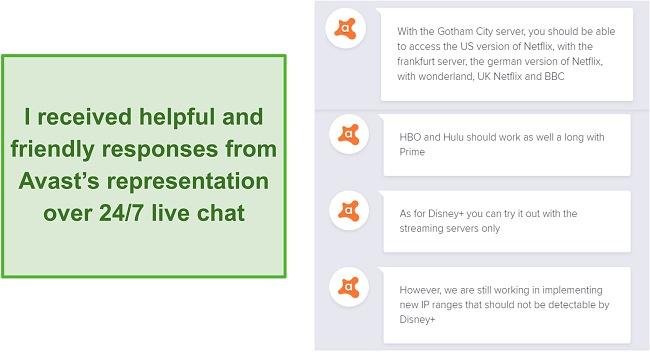
You can also try Avast’s phone support, but I found that it has the same issue where it can take a long time to connect you with an agent. Other than this, there’s also email support and a useful online knowledge base with helpful information.
So, even though both antiviruses offer multiple support channels, Kaspersky wins here because its support is much quicker.
Customer Service Winner: Kaspersky
13. Price — You’ll Get Better Value for Money With Kaspersky’s Plans
As for the pricing, both security apps offer multiple plans you can choose from. However, I found that Kaspersky’s plans offer much better value for money. It offers the following paid plans:
- Kaspersky Standard — Has Kaspersky’s core antivirus features, online payment protection, and optimization tools.
- Kaspersky Plus — Includes all the features in Standard while adding Kaspersky’s unlimited VPN, password manager, and WiFi Monitoring.
- Kaspersky Premium — Offers all the features in Plus and includes Data Leak Checker, 24/7 remote IT support, and Kaspersky’s Safe Kids parental controls.
I consider Kaspersky Plus the best value plan as it includes all the necessary anti-malware features, optimization tools, and an unlimited VPN. Kaspersky Premium’s 24/7 remote IT support and ID protection are appealing but aren’t worth the extra price. However, you should consider it if you have kids as this plan also offers Kaspersky’s parental controls.
It’s worth noting that each of Kaspersky’s plans protects 3, 5, or 10 devices, and the pricing varies depending on how many you want to protect. Also, the Premium plan protects up to 20 devices.
Avast, on the other hand, offers the following paid plans:
- Avast Premium Security — Offers Avast’s core antivirus features, WiFi protection, and web protection tools.
- Avast Ultimate — Has all of Premium Security’s features and provides Avast’s unlimited SecureLine VPN, Cleanup Premium optimization tool, and AntiTrack feature.
You can use Avast’s paid plans to protect 1 or 10 devices, and the price will go up a bit if you decide to get protection for 10 devices. Between both of Avast’s plans, I consider Avast Ultimate better as the price difference isn’t too significant, and the unlimited VPN provides much-needed additional security.
While both antiviruses have multiple plans, Kaspersky wins here as it provides better value for money.
Price Winner: Kaspersky
14. Free Version — Both Antiviruses Have a Free Plan, but Only Avast Works on Mac
I was pleased to learn that both Avast and Kaspersky offer free plans. Kaspersky’s free plan protects Windows, Android, and iOS devices. On the other hand, Avast also includes protection for macOS devices on its free plan.
While neither antivirus offers a feature-rich free plan, both provide their core antivirus and anti-ransomware features. So, they’re capable of providing basic security.
Although both antiviruses have similar free plans, Avast wins here as it also protects macOS, while Kaspersky’s free plan doesn’t.
Free Version Winner: Avast
Try Norton risk-free for 60 days
15. Money-Back Guarantee — Both Security Apps Offer a 30-Day Money-Back Guarantee
You’ll get a 30-day money-back guarantee with both Avast and Kaspersky. This guarantee gives you a month to test either antivirus completely risk-free before you commit to a full purchase.
I also like that both antiviruses provide a convenient way to claim your refund if you’re unsatisfied. Kaspersky lets you claim your refund by filling out an online form, and so does Avast. Simply navigate to either antivirus’ website, fill out the refund form with all your details, and wait for confirmation.
After testing both antiviruses and requesting a refund, I was pleased with the smooth process. I received a confirmation the same day I filled out the refund forms, and I had my money back within a week.
It’s worth highlighting here that Norton offers a generous 60-day money-back guarantee, twice as long as Avast and Kaspersky’s guarantee. So, it’s a better option if you feel that 30 days isn’t enough.
Since both Avast and Kaspersky offer the same money-back guarantee and a similar refund process, I’m calling it a tie here.
Money-Back Guarantee Winner: Tie
Try Norton risk-free for 60 days
And the Winner Is… Kaspersky (kind of)
After rigorous testing, both antiviruses tied in 4 categories, with Kaspersky winning in 9 and Avast winning in only 2. So, between these two choices, Kaspersky easily comes out ahead.
- Virus Scanner — Kaspersky
- Real-Time Malware Protection — Tie
- System Performance — Kaspersky
- VPN — Kaspersky
- Parental Controls — Kaspersky
- Firewall — Avast
- Password Manager — Kaspersky
- Gaming Mode — Tie
- Optimization Tools — Kaspersky
- Other Features — Kaspersky
- Device Compatibility — Tie
- Customer Service — Kaspersky
- Price — Kaspersky
- Free Version — Avast
- Money-Back Guarantee — Tie
Avast and Kaspersky are effective antiviruses with reliable malware detection and useful tools to provide added layers of security. Between the two, Kaspersky is better for overall device security, while Avast is more effective if you want an easier-to-use security app with an intuitive firewall.
However, even though Kaspersky is the better overall choice, thanks to its superior malware detection, impressive value for money, and extra features for additional security, I don’t recommend it. It’s based in Russia and thus has potential privacy concerns, with the primary one being that it’s required by law to cooperate with Russian intelligence.
Instead, I suggest you get Norton to secure your system because it’s a well-trusted name in the antivirus space. Also, Norton offers industry-leading 100% malware detection, many features for extra security, and a generous 60-day money-back guarantee.
Overall Winner: Kaspersky
How to Install Norton on Your Device
Although Kaspersky is technically better than Avast, I don’t suggest installing it. There are concerns about Kaspersky’s ties to the government, which could compromise your privacy. Instead, I advise installing Norton, as it’s the best security app. Plus, Norton offers a free trial that lets you try out all its features.
- Sign up for Norton’s free trial — Open Norton’s website, click the “Start free trial” option, and enter your credentials to sign up.
![Screenshot showing the sign up page for Norton's free trial]()
- Download Norton — Log into Norton’s website using the credentials you signed up with and click the Download button to get the setup.
![Screenshot showing Norton's web portal with the download option]()
- Install Norton — Run the setup and follow all its steps to install Norton on your system.
![Screenshot showing Norton's setup in progress]()
- Secure your system — After installing Norton, you can run its scans and use its various other features to safeguard your Windows PC from threats.
![Screenshot showing Norton's main menu after installation]()
That’s all you have to do! Following these steps lets you install Norton on your PC and secure it from every kind of cyber threat.
Try Norton risk-free for 60 days
FAQs About Avast And Kaspersky
Is Kaspersky better than Avast?
Yes, Kaspersky is better than Avast in most cases. Kaspersky has a slightly better malware detection rate, a greater variety of features, and much more responsive customer support. Plus, each of its plans offers better value for money.
However, Norton outperforms both these antiviruses thanks to its flawless malware detection via scans and against real-time threats. It also offers other useful features like encrypted cloud storage for sensitive files.
Can Avast and Kaspersky work together?
Which Kaspersky version should I get?
How do I remove Avast from my device?
It’s easy to remove Avast from your device if you want to install another high-end antivirus. Simply use the following steps:
- Open your installed apps menu. Navigate to your device’s installed apps/programs menu.
- Locate and select Avast. Find Avast inside the installed apps/programs menu by scrolling through it or using the search option.
- Click/tap on remove/uninstall. Once you’ve found Avast, click/tap on the uninstall option to remove it from your device.
If you uninstall Avast from your PC, you’ll have to rely on Windows’ built-in security for protection. While Microsoft Defender provides solid basic security, it’s not the most comprehensive solution, so it’s worthwhile to get a premium antivirus like Norton as a replacement.
Which one is the best overall antivirus?
Both Avast and Kaspersky have their strengths, but I wouldn’t consider either the best overall antivirus. Neither detects 100% of malware via scans, and privacy concerns behind each keep them from being the best choices.
Fortunately, other top-tier antiviruses offer flawless malware detection and useful features to safeguard you from cyber threats.

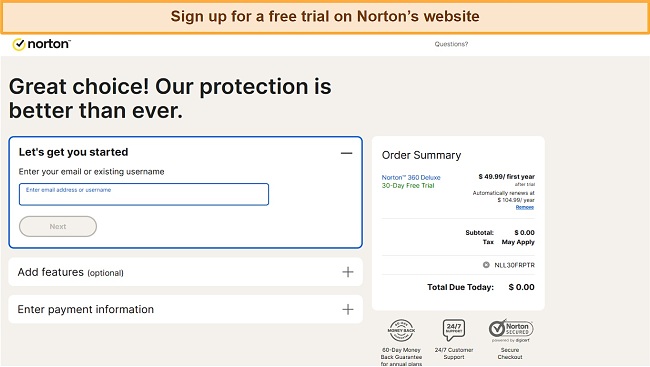
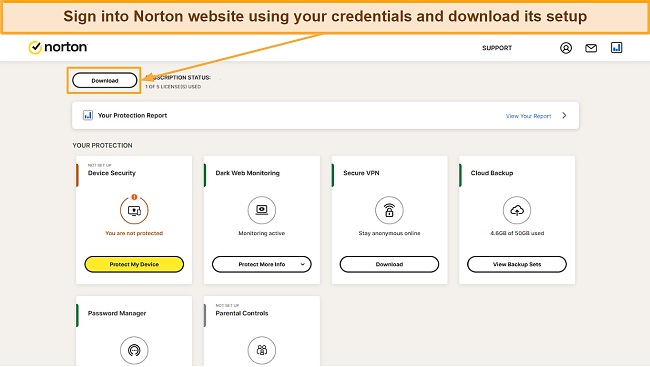
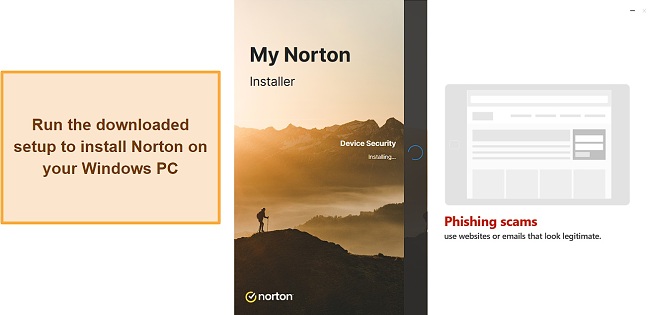
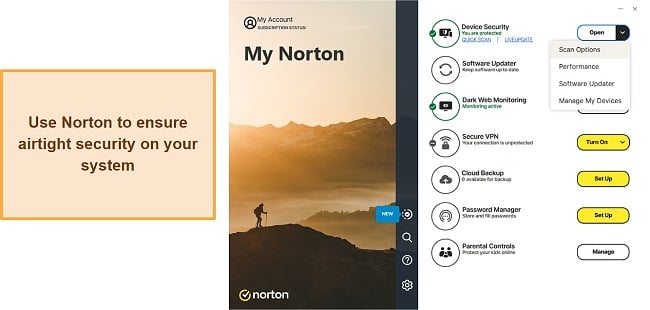



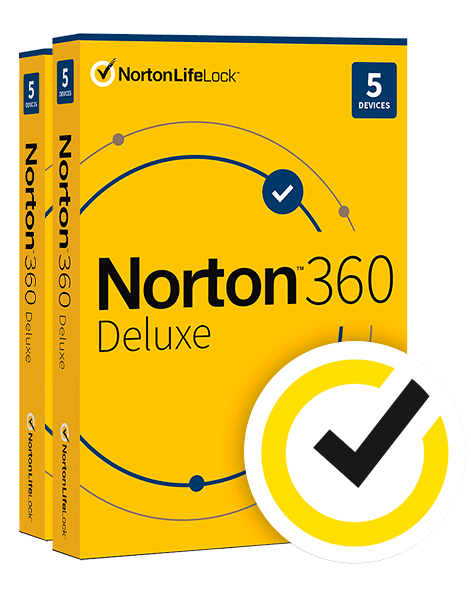
Leave a Comment
Cancel